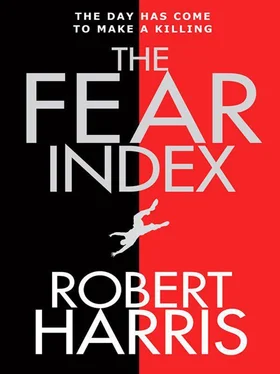Robert Harris - The Fear Index
Здесь есть возможность читать онлайн «Robert Harris - The Fear Index» весь текст электронной книги совершенно бесплатно (целиком полную версию без сокращений). В некоторых случаях можно слушать аудио, скачать через торрент в формате fb2 и присутствует краткое содержание. Жанр: Триллер, на английском языке. Описание произведения, (предисловие) а так же отзывы посетителей доступны на портале библиотеки ЛибКат.
- Название:The Fear Index
- Автор:
- Жанр:
- Год:неизвестен
- ISBN:нет данных
- Рейтинг книги:4 / 5. Голосов: 1
-
Избранное:Добавить в избранное
- Отзывы:
-
Ваша оценка:
- 80
- 1
- 2
- 3
- 4
- 5
The Fear Index: краткое содержание, описание и аннотация
Предлагаем к чтению аннотацию, описание, краткое содержание или предисловие (зависит от того, что написал сам автор книги «The Fear Index»). Если вы не нашли необходимую информацию о книге — напишите в комментариях, мы постараемся отыскать её.
The Fear Index — читать онлайн бесплатно полную книгу (весь текст) целиком
Ниже представлен текст книги, разбитый по страницам. Система сохранения места последней прочитанной страницы, позволяет с удобством читать онлайн бесплатно книгу «The Fear Index», без необходимости каждый раз заново искать на чём Вы остановились. Поставьте закладку, и сможете в любой момент перейти на страницу, на которой закончили чтение.
Интервал:
Закладка:
‘If you would wait just a moment, please, Dr Hoffmann,’ said Paccard. He held up his hand in a polite plea for silence and stared into the middle distance. He had a wire trailing from his ear. ‘Fine,’ he said. ‘We can go.’
He moved swiftly to the entrance, hitting the exit button with the heel of his hand precisely as a long dark Mercedes drew up at the kerb, with the same driver who had picked Hoffmann up from the hospital. Paccard strode out first, opened the rear passenger door and ushered Hoffmann inside. His palm briefly brushed the back of the physicist’s neck. Before Hoffmann even had the chance to settle himself into his seat, Paccard was sliding into the front, the car doors were all closed and locked, and they were pulling out into the noonday traffic. The whole procedure must have taken less than ten seconds.
They made a sharp left, tyres squealing, and shot down a gloomy side street, which opened at the end on to the lake and the distant view of the mountains. The sun had still not broken through the cloud. The high white column of the Jet d’Eau rose 140 metres against the grey sky, dissolving at its top into a chilly rain that plunged to detonate against the dull black surface of the lake. The flashes from the cameras of the tourists photographing one another at its base winked bright in the gloom.
The Mercedes accelerated to beat a red light and made another sharp left into the dual carriageway, only to come to a halt alongside the Jardin Anglais, held up by some unseen obstruction ahead. Paccard craned his neck to see what was happening.
This was where Hoffmann sometimes went for a jog if he had a problem to solve – from here across to the Parc des Eaux-Vives and back again, two or three times if necessary, until he had found an answer, talking to no one, looking at nothing. He had never really examined the area properly before, so that now he gazed out at the unseen familiarity with a kind of wonder: the kids’ play area with the blue plastic slides, the outdoor creperie under the trees, the pedestrian crossing where he might have to jog on the spot for a minute waiting for the lights to change. For the second time that day he felt as if he were a visitor to his own life, and he had a sudden desire to order the driver to stop the car and let him out. But no sooner had the thought arisen than the Mercedes moved forward again. They entered the busy traffic system at the end of the Pont du Mont-Blanc and emerged from it at speed a few seconds later, weaving westwards through the slower trucks and buses towards the galleries and antique shops of the Plaine de Plainpalais.
8
There is no exception to the rule that every organic being naturally increases at so high a rate, that if not destroyed, the earth would soon be covered by the progeny of a single pair.
CHARLES DARWIN, On the Origin of Species (1859)Contours De L’homme: Une exposition de l’oeuvre de Gabrielle Hoffmann – how much more impressive it sounded in French than English, she thought – was scheduled to run for one week only at the Galerie d’Art Contemporain Guy Bertrand, a small whitewashed space, previously a Citroen auto-repair shop, in a back street around the corner from MAMCO, the city’s main contemporary art gallery.
Gabrielle had found herself sitting next to the owner, M. Bertrand, five months earlier at a Christmas charity auction at the Mandarin Oriental Hotel – an event Alex had flatly refused to attend – and the next day he had wheedled his way into her studio to see what she was working on. After ten minutes of outrageous flattery, he had offered to give her an exhibition in return for half of any proceeds, as long as she paid the expenses. Of course she had realised at once that it was Alex’s money rather than her talent that was the main attraction. She had observed over the last couple of years how great wealth acted like an invisible magnetic force field, pushing and pulling people out of their normal pattern of behaviour. But she had also learned to live with it. You could go mad trying to guess whose actions were genuine, whose false. Besides, she wanted to have a show – wanted it, she realised, more keenly than she had ever wanted anything in her life, except to have a child.
Bertrand had urged her to throw an opening-night party: it would build interest, he said, and drum up some publicity. Gabrielle had demurred. She knew that her husband would sink into misery for days beforehand at the prospect of such an occasion. In the end, they had compromised. When the doors opened quietly at eleven that morning, two young waitresses in white blouses and black miniskirts stood offering flutes of Pol Roger and plates of canapes to everyone who crossed the threshold. Gabrielle had worried that no one would show up, but they did: the gallery’s regulars, who had received an emailed flyer advertising the exhibition; passers-by attracted by the sight of a free drink; and her own friends and acquaintances who she had been calling and emailing for weeks beforehand – names from old address books, people she hadn’t seen for years. All had turned up. The result was that by noon, a sizeable party of more than a hundred was in progress, spilling out through the doors and on to the pavement where the smokers gathered.
Halfway through her second glass of champagne, Gabrielle realised she was actually enjoying herself. Her oeuvre consisted of twenty-seven pieces – everything she had finished over the past three years, apart from her very first self-portrait, which Alex had asked if they could keep and which remained on the coffee table in the drawing room. And the truth was, once it all was gathered together and properly lit – the engravings on glass especially – it did look like a solid, professional body of work: at least as impressive as most openings she had attended in her time. No one had laughed. People had looked carefully and made thoughtful comments, mostly complimentary. The earnest young reporter from the Geneva Tribune had even compared her emphasis on the simplicity of the line with Giacometti’s topography of the head. Her only remaining anxiety was that nothing had yet sold, which she blamed on the high prices Bertrand had insisted on charging, from 4,500 Swiss francs – about $5,000 – for the CAT scans of the smallest animal heads up to 18,000 for the big MRI portrait, The Invisible Man. If nothing had gone by the end of the day, it would be a humiliation.
She tried to forget about it and pay attention to what the man opposite her was saying. It was difficult to hear over the noise. She had to interrupt him. She put her hand on his arm. ‘I’m sorry, what did you say your name was again?’
‘Bob Walton. I used to work with Alex at CERN. I was just saying that I think you two first met at a party in my house.’
‘Oh my God,’ she said, ‘that’s quite right. How are you?’ She shook his hand and looked at him properly for the first time: thin, tall, neat, grey – ascetic, she decided; either that or just plain severe. He could have been a monk – no, more senior than that, he had authority: an abbot. She said, ‘It’s funny – I just tagged along to that party with friends. I’m not sure we’ve ever been formally introduced, have we?’
‘I believe not.’
‘Well – thank you, belatedly. You changed my life.’
He didn’t smile. ‘I haven’t seen Alex for years. He is coming, I assume?’
‘I certainly hope so.’ Once again her eyes flickered to the door in the hope that Alex would walk through it. So far all her husband had done was to send her the taciturn bodyguard, who had now stationed himself at the entrance like a nightclub bouncer and occasionally seemed to speak into his sleeve. ‘So what brings you here? Are you a gallery regular or just a passer-by?’
Читать дальшеИнтервал:
Закладка:
Похожие книги на «The Fear Index»
Представляем Вашему вниманию похожие книги на «The Fear Index» списком для выбора. Мы отобрали схожую по названию и смыслу литературу в надежде предоставить читателям больше вариантов отыскать новые, интересные, ещё непрочитанные произведения.
Обсуждение, отзывы о книге «The Fear Index» и просто собственные мнения читателей. Оставьте ваши комментарии, напишите, что Вы думаете о произведении, его смысле или главных героях. Укажите что конкретно понравилось, а что нет, и почему Вы так считаете.










